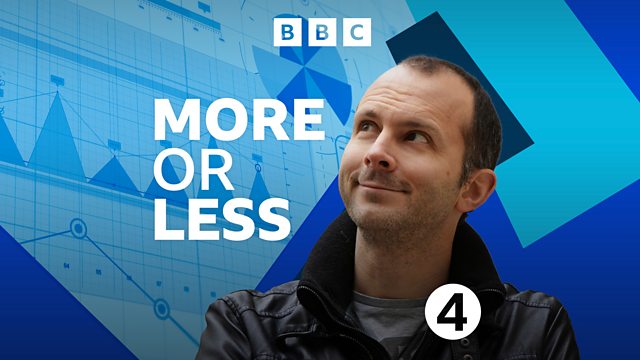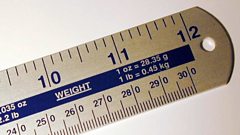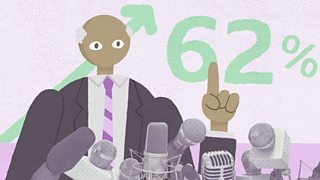
Strictly Voting Fiasco - Imperial Measures - Childhood Obesity - Knife-Crime Statistics
Tim Harford explores whether the Strictly Come Dancing results were really due to a set of "exceptional circumstances"? Plus, imperial measures.
Strictly Voting Fiasco
Saturday's edition of Strictly Come Dancing was thrown into chaos. The TV show's producers realised that it was mathematically impossible for a public telephone vote to influence the contest.
This came after the marks the studio judges awarded put two of the contestants in joint first place. The Βι¶ΉΤΌΕΔ executive in charge of the programme put the problem down to "exceptional circumstances".
More or Less listener Dirk Nachbar disagrees. From his hospital bed, he ran a computer simulation, based on past scores, and concluded that the chance of such a problem was 1 in 8.
Our reporter, former computer programmer Oliver Hawkins, has run his own simulation and come up with a similar result. Watch him explain it.
More Credit Crunch Maths
Financial mathematics guru Paul Wilmott continues with his More or Less series explaining how mathematical blunders contributed to the credit crunch.
This week, he talks us through the maths error that might have contributed to the mispricing of financial derivatives and thus to the travails of the banks, the credit crunch, and the recession.
Imperial Measures
Tim Harford talks pounds and kilos with Derek Pollard. Pints, miles, pounds and inches. They are fiendishly complicated and politicians have tried to ban their use, but for some reason imperial measures have proved impossible to kill off.
This week, the European Parliament voted to allow UK consumers to use both metric and imperial measures. It marks the end of a long campaign to make Britain fully metric.
Warwick Cairns, author of About the Size of It explains the appeal of imperial whilst Derek Pollard, Secretary of the Metric Association vows to carry on the fight for a "single rational system".
Childhood Obesity
The Chief Medical Officer for England, Sir Liam Donaldson, this week reiterated his appeal for urgent action on childhood obesity, claiming in an online article for Βι¶ΉΤΌΕΔ News that "the obesity epidemic" is a national crisis and that to do nothing was not an option.
According to the Health Survey for England, a quarter of 5 year olds are obese or overweight. Simon Cox, presenter of our sister programme The Investigation explains why the figures exaggerate the extent of the problem.
Knife-Crime Statistics
"Fewer teenagers are being wounded by knives" claimed a Βι¶ΉΤΌΕΔ Office press release issued last week. How accurate are the latest government figures on knife crime?
Figures in the document purported to show that the government's Tackling Knives Action Plan had been a great success. The head of the UK Statistics Authority, Sir Michael Scholar, disagreed.
On Friday he condemned the government for releasing "unchecked" and "selective" numbers against the advice of professional statisticians. So why might an apparent fall crime be not all it seems? It could be something to do with a concept called "regression to the mean".
Last on
Clip
-
![]()
Imperial versus metric
Duration: 07:12
Broadcasts
- Fri 19 Dec 2008 13:30Βι¶ΉΤΌΕΔ Radio 4
- Sun 21 Dec 2008 20:00Βι¶ΉΤΌΕΔ Radio 4
Just how reliable is our intuition? Find out with The Open University
OU Connect: Put your brain to the test with our new mind-bending probability problems!



